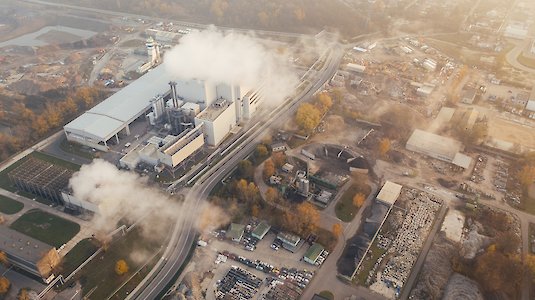How chemicals harm the climate
The production of chemicals consumes energy and raw materials, causes huge amounts of CO2 emissions. And thus drives climate change! But let's take it one step at a time ...
Chemical industry? What? How? Chemicals affect the climate? How now? There is a connection between chemical industry and climate catastrophe? I thought it was mainly cars that were responsible for climate change. But that is not the case. And right from the start: without changes in the production of chemicals, we will not get a grip on the climate crisis.
For a toxic-free future? But at present, the chemical industry is growing dramatically and producing plastics en masse. In fact, plastic production is currently accelerating and is expected to "increase by 30-36% over the next six years", says Pamela Miller, co-chair of International Pollutants Elimination Network (IPEN), which campaigns "for a toxic-free future".
The chemical industry affects the climate through energy consumption in production. But also through "hidden" carbon in plastics created before it - which is released when they are "disposed of". Let's look at these points in detail.
Energy waste. Huge! A lot of energy has to be used to produce chemicals, often from fossil sources. In fact, within the manufacturing sector, the chemical industry currently consumes the most energy in the world - causing huge amounts of CO2 emissions. And thus driving climate change.
Now! And not later. But: the petrochemical industry is growing and growing and will consume 70% of the projected increase in oil demand by 2026. However, the consumption of fossil fuels must be drastically reduced. And immediately! This is the only way to curb global CO2 emissions. Because the window of opportunity to slow down climate change has already become alarmingly small! A way out? Keyword: decarbonisation! In other words, the conversion of the energy industry - including the chemical industry - in the direction of a lower turnover of carbon.
Raw material consumption. The chemical industry uses fossil raw materials to manufacture the products we use every day, such as plastic packaging. As a result, these things - including the keyboard of a laptop or the interior of a car - contain "hidden" carbon. Because these very products were made from petroleum. We are talking about quantities that are unimaginable for the average citizen: The global demand for products made from petroleum currently generates 450 megatonnes of embedded carbon per year! That is 450,000,000 tonnes!
Problem disposed of? Problem: Disposal! If these plastic products are incinerated when they are no longer needed, the "hidden" carbon is released. But this also happens in a landfill, for example when plastic packaging is "naturally" degraded. The above-mentioned incredible 450 megatonnes of embedded carbon thus develop huge CO2 emissions (i.e. for the second time, as the first ones have already been created during production ...), thus accelerating climate change. This must be clear to all.
Stop! What can be done? In addition to the decarbonisation mentioned, the type of materials urgently needs to be changed. So away from "hidden" carbon. The carbon used by the chemical industry must come from recycled materials. In doing so, the quantities of recycled materials used in production must be increased by more than twenty times compared to today.
Very easily said. But not easily done. After all, collection infrastructures and recycling technologies are often lacking. This needs to be improved quickly. Then there is the dilemma of hazardous substances in the recycled material. These are major challenges - but they must be tackled. For the survival of mankind is at stake!
Buy Less, Choose Well, Make it Last. Consumers can also make a contribution to keeping the climate-damaging impact of chemicals as low as possible. How? The British designer Vivienne Westwood knows the answer when she demands: "Buy Less, Choose Well, Make it Last". Very important words, because today clothing in particular is often made of synthetic, "chemical" fibres.
Insight. There is a very strong link between climate change and the production of chemicals. We need to demand policy action to mitigate the consequences of this linkage. Stronger regulation and stricter control of the chemical industry is an important approach. And the education of consumers, who are also responsible! And can rethink their buying behaviour every day!
